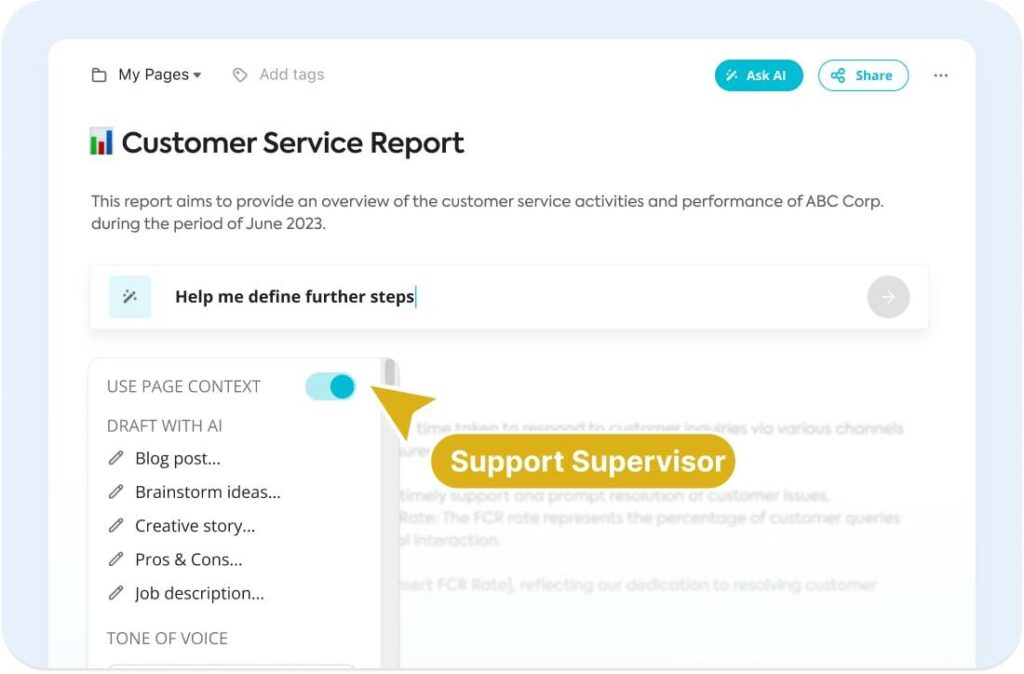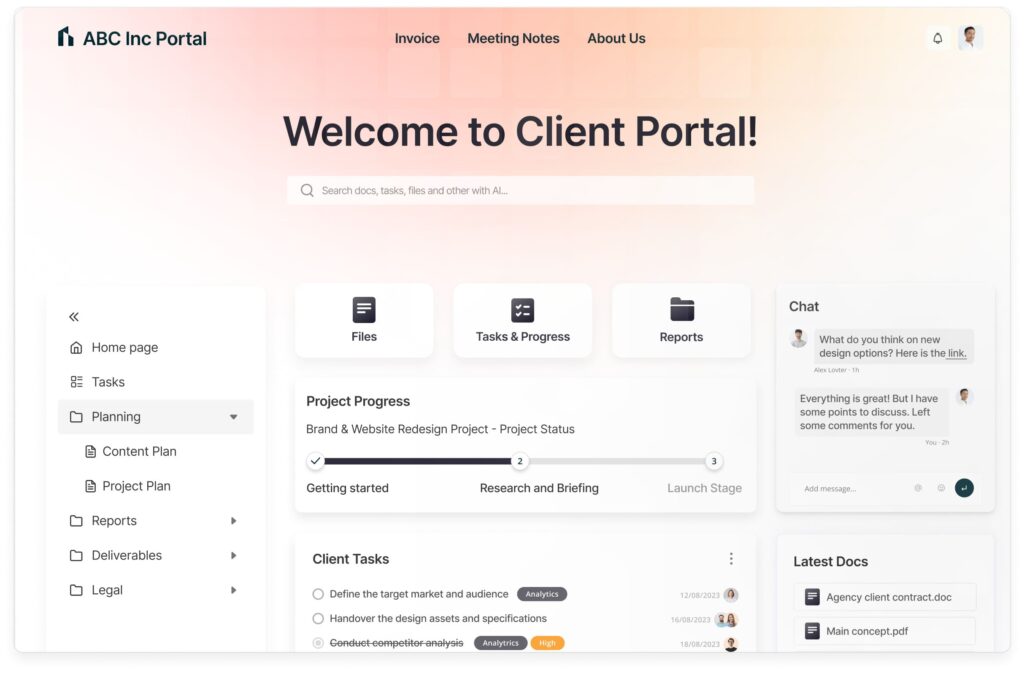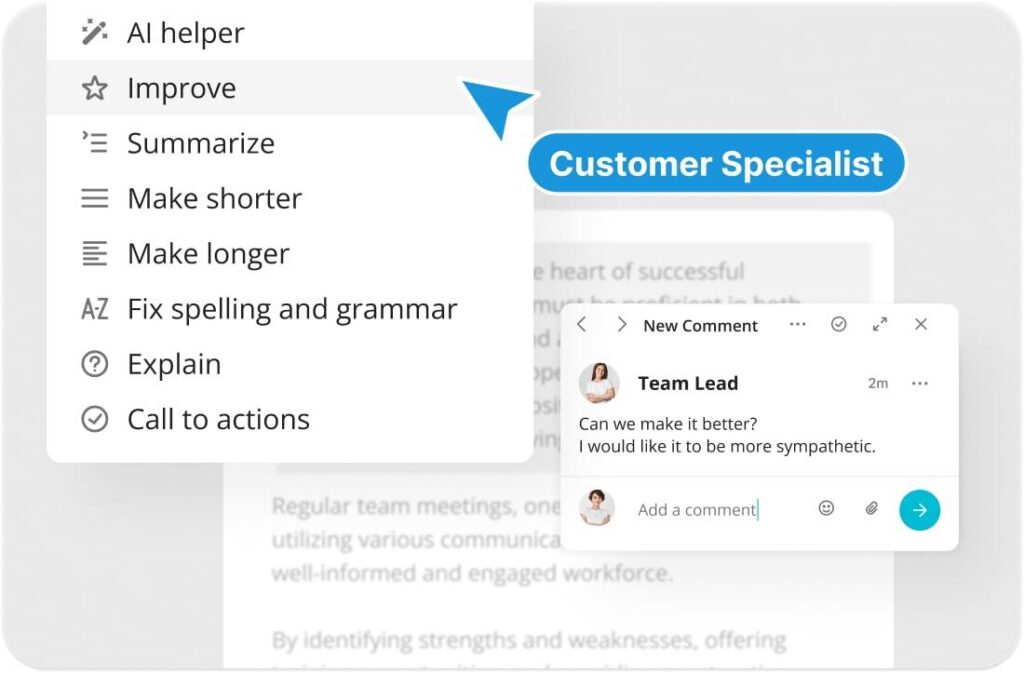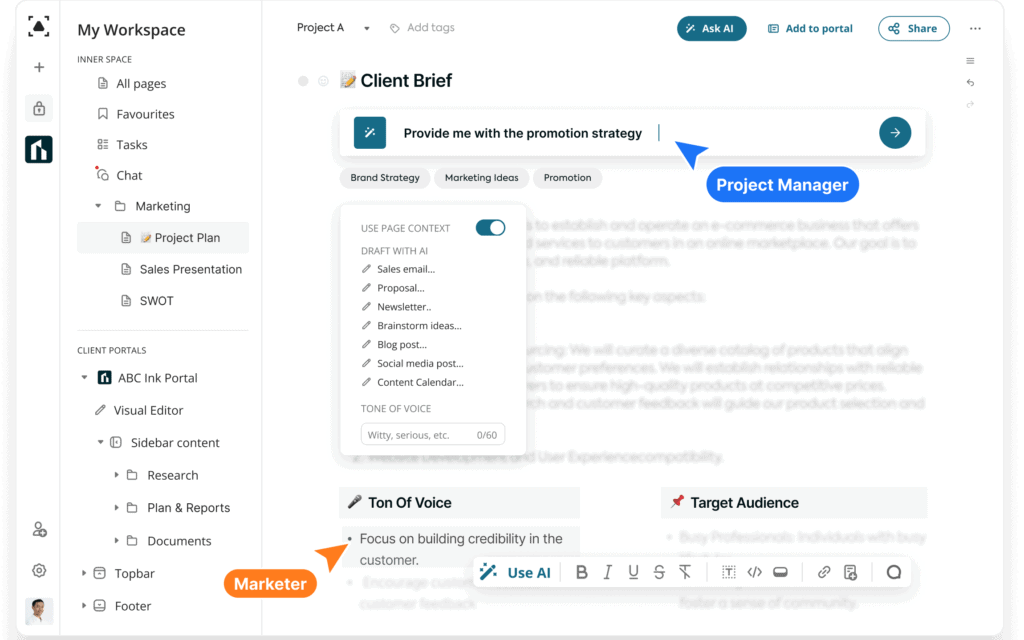
Onboarding vs. Implementation: Do You Need Both?
- 9 Min read
Step into the AI customer support software revolution and get ready to experience a whole new level of engagement with your customers! To maximize efficiency, businesses are turning towards AI-powered client support software that’s tailored to their individual needs. Let us introduce you to all aspects of this technology – its evolution over time, pros & cons as well as strategies to tackle any challenges associated with it, so you can choose the right solution for best results.

Businesses are increasingly recognizing the potential of customer service AI. This has resulted in a transformation of how customer service teams work, made possible by incorporating AI-driven tools and solutions.
These solutions offer numerous advantages such as streamlining processes for faster inquiry resolutions, augmenting overall experience with customer interactions through automated tasks and managing repetitive operations that provide support to clients’ demands efficiently without compromising quality during customer service interactions.
AI integration thus not only optimizes services but also leads to greater customer pleasure, while accelerating the team’s performance and ability to provide necessary answers swiftly yet accurately using applications like Custify, Freshdesk or Help Scout among others.
The implementation of customer service AI quick fixes such as chatbots, NLP tools and AI-driven helpdesk systems has revolutionized the way businesses manage their customer interactions. These advanced technologies have enabled organizations to provide customers with tailored experiences at an accelerated rate while simultaneously optimizing operational costs and transforming customer service.
Leading support platforms including IBM Watson Assistant, ChatBot and Zoho Desk offer a broad range of features like user segmentation based on machine learning technology, detailed analytics reports along with secure data protection protocols designed for optimal results in providing superior service levels.
Integrating AI into customer support brings a host of advantages, such as swift response times, improved accuracy in responses and personalized interactions. Businesses can employ these tools to automate tasks, diminish escalations and enhance the overall client experience on a large scale by providing customized services.
Using natural language processing (NLP) for client service helps recognize customers’ questions more effectively with greater precision while evaluating their opinions or sentiments expressed through feedback. Bots are especially efficient at determining what clients want – allowing them to give precise answers that maximize agents’ efficiency level, leading to higher satisfaction levels among consumers and making work a little easier for support teams.
AI customer service software is becoming increasingly popular for businesses to explore. These solutions fall into three main categories: chatbot platforms, AI-driven helpdesk systems and NLP tools. Each has features suited to various needs of the company’s goals in terms of customer support. Popular choices among these kinds of programs include HubSpot CRM, Churn360, Custify and FreshDesk – all covering ticketing, customer service agent, chatbots, contact centers as well as self-service portals offering great options for successful AI based customer services. But it would be best if you never underestimated your support teams. Even with an AI in customer service, it’s not easy to deal with all customer requests.
Chatbot platforms aim to provide swift customer service, dealing with high volumes of inquiries from customers and personalized conversations. By utilizing AI-driven chatbots that are programmed to store previous interactions for reference, they understand the needs of users better and can offer immediate replies when it comes to typical requests. The AI system can be programmed to respond to customer queriesand requests, and it can simulate a human conversation.
To help businesses deliver higher client satisfaction and maximize customer experience through automated solutions, such as AI customer service chatbot,, Kustomer, LivePerson, Netomi or Balto can be used as their main platform provider. By automating repetitive processes, agents would have more time available to focus on complex tasks while still being able to deliver an efficient support system and resolve customer support requests with seamless results overall, making the customer service process faster and smoother.
AI-powered helpdesk systems are key in automating tasks, effectively routing tickets and offering a consolidated view of customer interactions. By employing machine learning technology, these solutions direct customer support queries based on elements like language, mood or account information.
Platforms such as Freshdesk, Zendesk and Atera offer AI powered assistance services that assist to boost operational efficiency as well as advance agent proficiency too. Their features cover analytical dashboards for service desks, proactive workflow templates plus tailored user interfaces which guarantee reliable service delivery with the assurance of unified consumer experience across different products.
AI customer solutions and customer self-service, such as LivePerson’s large language models (LLMs) and Landbot’s strategies for customer support, utilize NLP tools to interpret human speech. These powerful NLP resources enable businesses to process inquiries quickly and deliver a response that is tailored based on the conversation context or sentiment. As a result of this technology, customers feel valued with personalized service instead of an impersonal automated reply, creating loyalty along with satisfaction in interactions. Improve the customer journey by implementing an AI tool in your customer support process.

When selecting the appropriate AI Customer Service Software, various factors must be taken into account in order to make an informed decision that best suits your company’s needs and goals. It is essential to assess integration capabilities with existing systems as well as scalability for future growth when considering any solution. It’s important to factor in a cost/ROI analysis so you can determine which option provides maximum value.
Understanding what challenges are being faced and analyzing desired outcomes of your business first hand will help establish parameters for selecting the right fit among all possible solutions available on the market today.
When establishing objectives for a business, it is important to define the precise challenges and desired outcomes in order to select the most appropriate AI customer support solution. Factors such as size of client base, complexity of queries and response time must all be taken into account when making this decision. Doing so will guarantee that not only are current requirements met, but also allow room for potential expansion.
Considering elements like these means businesses can get an improved understanding of what they require from their chosen AI service provider. Doing thorough research on factors such as customer inquiries or satisfaction levels enables better judgment by giving you access to informed details about your pick of automation-driven technologies.
When selecting AI customer service software, integration and scalability are two essential aspects that must be taken into account. Thus, when making a decision, it is important to ensure its seamless fit with the existing infrastructure of customer service tools as well as ease in implementation and transitioning processes. Businesses should consider how easily the chosen solution can grow along with their business needs, including increased demand for customers’ services requirements or higher volumes in support responses. This guarantees they have selected the right system for them.
When considering AI customer service software, it is essential to assess the costs associated with both purchasing and implementing it as well as potential return on investment (ROI). This allows businesses to make an informed decision about which solution best meets their individual needs.
Maximizing ROI over time can guarantee that your chosen AI customer service software will be cost-effective while fulfilling company requirements in the long run. Knowing this should provide peace of mind for companies when selecting a suitable option for them.
The successful implementation of AI customer service software or AI customer service solutions requires careful preparation and roll-out. A prudent strategy is to deploy gradually, provide customer onboarding for the agents and monitor performance while gathering feedback along the way.
This gradual approach permits businesses to incorporate these tools step by step. Provide time for employees and support teams to adjust and become familiar with them. Trainings equip staff with essential skills needed to operate this technology proficiently. Continuously monitoring its efficacy while receiving feedback from customers enables organizations to operate effectively.
AI customer service software can be brought in incrementally. It can be used for specific tasks before gradually expanding its use across other parts of the service. This method allows organizations to introduce AI tools at a controlled pace, allowing changes and improvements as needed throughout implementation.
Rolling out such technology bit-by-bit eases staff into the transition period while giving them time to become comfortable with this new system and update their processes accordingly. This phased approach is essential for ensuring success when introducing AI customer support solutions within businesses.

To increase customer satisfaction and loyalty, businesses should provide extensive training programs that cover the features of AI Customer Service Software. This will equip support agents with all they need to respond efficiently and personally to inquiries. Onboarding is also a key step in implementing such software successfully as it ensures everyone can utilize its functionalities well and deliver a first-rate customer experience. With adequate instruction on how best to use the system plus any resources needed, staff members will be able to master every aspect of this tool so customers’ needs are met swiftly.
Evaluating the performance of AI customer service software and obtaining client feedback are both essential to successful implementation. Businesses should measure response time, resolution rate and consumer satisfaction levels in order to assess how effective their tools have been in meeting expectations. Taking into account user input allows them to determine what can be done for future improvements or adaptations that may better suit customers’ needs, which will lead to an increase of loyalty towards a company and higher overall customer happiness by way of more engaging interactions. By carefully listening to responses from users while making necessary adjustments, it is possible to ensure the ongoing effectiveness of any AI based system used for customer service solutions.
Businesses looking to utilize AI in their customer service strategies may face some challenges. Such as cost management, dealing with customer queries, data privacy assurance and the maintenance of a human touch when it comes to interacting with customers.
To successfully tackle these obstacles, they must choose economical Artificial Intelligence solutions which offer high returns on investment along with long-term benefits. They should also prioritize security protocols for safeguarding consumer info while simultaneously making sure that human agents are providing understanding and empathy when situations get complicated instead of letting machines take over.
For successful implementation of AI customer service software, businesses should be cognizant of managing the associated costs. It is important to select solutions that bring substantial returns on investment and long-term advantages such as enhanced client satisfaction, diminished support expenses and augmented agent proficiency.
Apart from evaluating the cost of buying the technology itself, organizations must also consider other factors like training charges and installation fees when adopting AI customer service applications. This will enable them to get maximum benefit while minimizing its financial burden at launch time. Also AI can even analyze a customer interaction and understand the customer’s sentiment and intent.
When implementing AI customer service software, businesses should prioritize customer data protection and data room protection in order to ensure the secure handling of customers’ sensitive information. This includes verifying that the chosen solution is compliant with regulations such as GDPR and HIPAA. Necessary security measures must be taken so as not to breach any trust established between business and their clientele or face possible legal consequences. Examples of these protective steps include encryption technology along with access control systems for safeguarding against unwanted third-party involvement with a customer’s data.
Businesses must find a balance between automation and empathy in order to successfully deploy AI customer support solutions—preserving the human touch that’s essential for building lasting customer relationships. This allows them to provide efficient service as well as personalized assistance with complex inquiries, ultimately creating an engaging experience for their customers.
To make sure these tools supplement rather than replace agents, businesses should use AI technologies mainly for handling repetitive tasks so humans can focus on providing compassionate interactions that foster loyalty.

In the ever-evolving landscape of customer support solutions and customer communication, FuseBase AI emerges as a standout platform that harnesses the power of artificial intelligence to redefine customer engagement. As businesses continue to seek ways to optimize their operations and enhance customer satisfaction, FuseBase AI steps onto the stage with a suite of innovative features designed to revolutionize customer service platform experiences.
FuseBase AI is at the forefront of the AI-driven customer support revolution, offering a comprehensive array of features that cater to the diverse needs of CX professionals. With a focus on seamless integration and personalized interactions, FuseBase AI empowers businesses to streamline processes, reduce response times and elevate the overall customer experience. Furthermore, you get an AI tool to advise how you can scale your customer service operations.
One of FuseBase AI’s standout features is its advanced automation capabilities. Through sophisticated chatbots and NLP tools, FuseBase AI swiftly interprets customer inquiries and provides accurate responses, freeing up support agents to tackle more complex tasks. Whether it’s addressing common queries or guiding customers through intricate processes, FuseBase AI’s automation ensures a faster, more efficient support system.
FuseBase AI goes beyond automation by maintaining a strong human touch in customer interactions. By analyzing sentiment and context, FuseBase AI crafts personalized responses that resonate with customers on a deeper level. This blend of AI-driven efficiency and human empathy creates a support experience that’s not only efficient but also emotionally resonant, fostering stronger customer loyalty.
FuseBase AI’s algorithms are continuously learning and evolving, adapting to changing customer behaviors and preferences. This adaptability ensures the platform remains effective in addressing dynamic customer needs and industry trends. With every interaction, FuseBase AI gathers valuable insights that contribute to refining its responses and enhancing customer satisfaction over time.
Imagine a scenario where a customer seeks assistance with a complex product configuration. FuseBase AI instantly understands the customer’s query through its NLP capabilities and provides step-by-step guidance, all while infusing a personalized touch in customer conversations. As the conversation progresses, FuseBase AI remembers past interactions, ensuring a seamless and cohesive support experience.
In a world where customer expectations are constantly evolving, FuseBase AI sets the stage for a new era of customer support excellence. By seamlessly blending automation, personalization and continuous learning, FuseBase AI empowers businesses to forge stronger customer relationships, drive operational efficiency and stay ahead in a competitive market.
As businesses continue to explore the realm of AI-driven customer support, FuseBase AI stands as a prime example of how cutting-edge technology can reshape the way we engage with customers. With its forward-looking approach and commitment to enhancing customer experiences, FuseBase AI is poised to shape the future of customer support in remarkable ways.
To learn more about FuseBase AI and its transformative capabilities, visit the website page about FuseBase AI.
Ready to Elevate Your Business with FuseBase AI Experts?
By judiciously evaluating factors like desired outcomes, integration and scalability, as well as cost-benefit analysis, businesses can select the most fitting AI customer service software to innovate their customer service activities. This technology has the capacity to modify client communication significantly in a way that optimizes customer satisfaction while remaining faithful to human interaction principles. With thoughtful strategies of implementation coupled with consistent maintenance of an emotionally tangible environment, companies are surefooted for long term success by embracing advances in Artificial Intelligence within their client relations realm.
AI technologies are utilized for customer service automation, including chatbots, NLP, facial and voice recognition systems, IVR (Interactive Voice Response) and Intelligent Virtual Assistants. These tools facilitate everyday tasks while aiding customers with standard inquiries.
To provide superior customer service, Zendesk AI and Aisera offer advanced neural network-based services including automated response bots, conversational capability across languages, generative AI capabilities and automation.
When choosing the best software for 2023, several names stand out from The Best AI Chatbots for Customer Service List, such as 16 Best AI Chatbot Softwares (2023), plus two of the top picks when it comes to utilizing neural network in terms of providing support – Best AI-Based Customer Support Tools (2023).
AI can optimize customer service processes and make them more efficient. Through automation of recurrent queries, it lightens the load for agents in order to allow them to focus on complex tasks that require specialized expertise. AI-powered systems are able to provide customers with quicker answers as well as an increased level of accuracy when responding to their inquiries, consequently leading to improved satisfaction rates among users.
Businesses must ensure data protection and security when using AI customer service software by opting for solutions that prioritize privacy, make use of encryption technology and comply with legal requirements. These measures should help guarantee the confidentiality of customers’ information as well as ensuring access is restricted only to authorized personnel. Encryption protocols will defend transmitted or stored data while access control policies can limit who may have access to such confidential records.
Employees should be trained and familiarized with AI customer service software, while monitoring the performance and any feedback to ensure success. Gradual implementation is key for this process of customer service experience.
Disclaimer
Parties other than FuseBase may provide products, services, recommendations, or views on FuseBase site (“Third Party Materials”). FuseBase is not responsible for examining or evaluating such Third Party Materials, and does not provide any warranties relating to the Third Party Materials. Links to such Third Party Materials are for your convenience and do not constitute an endorsement of such Third Party Materials.
Found it useful? Share the article with your community
Get weekly tips and insights on how to grow your business